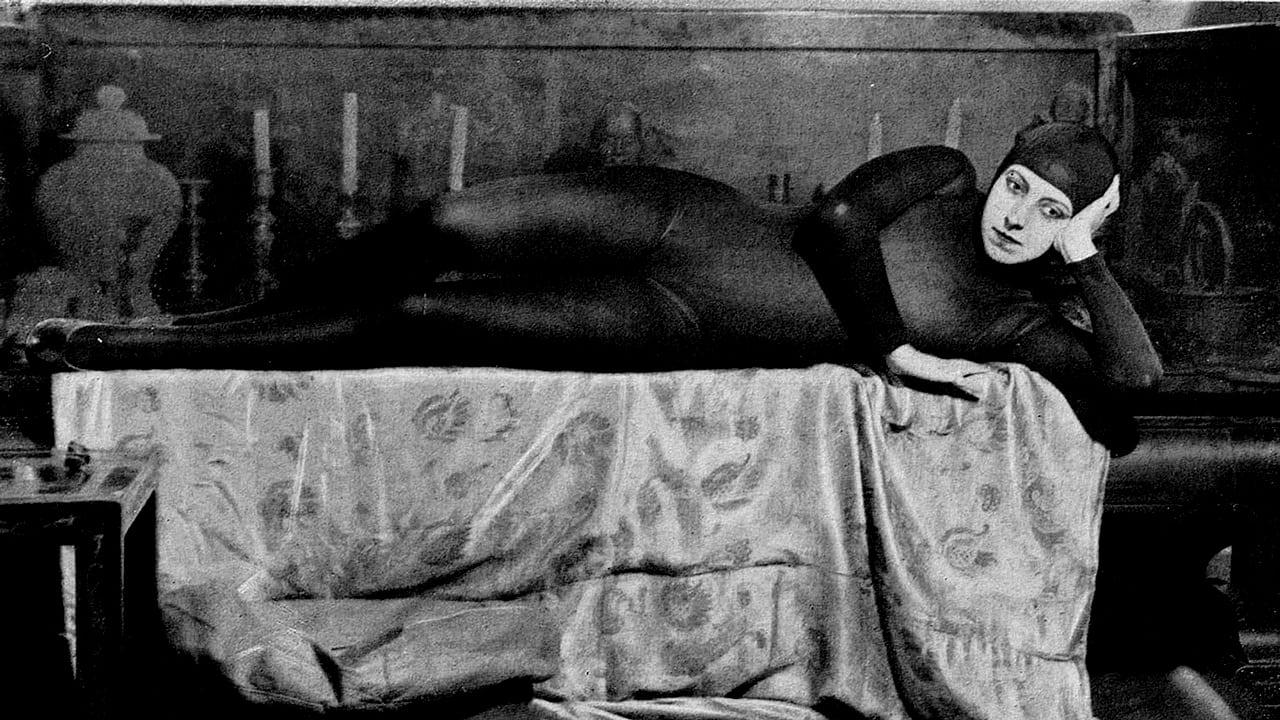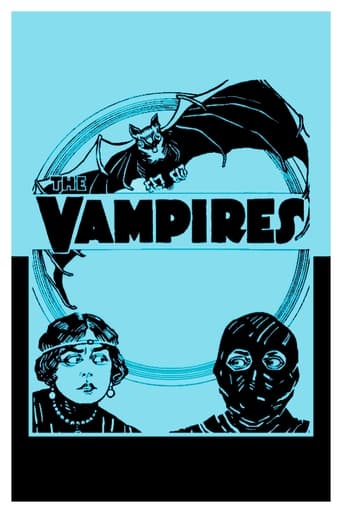

A ten-part serial that took eight hours to watch with breaks, this thing defies not just summary but reliable recall: describing it is like trying to describe a year in my life. Chaotic, unpredictable, upside down, with endless sneaky tricks that defy our conception of 'movie' magic because they mainly involve Cirque-type human machines doing things that couldn't have been faked so convincingly at this date. I mean, you can see the splice whenever a character turns on the light, so when the bitchy criminal mastermind Irma Vep gets wrapped up in rope, then rolls down the side of a four-story building like a human yo-yo, you know you're watching history in the making. What's more, and redemptively, the stupid detectives are REALLY stupid, including this outrageous Italian stereotype who keeps nyuk-ing straight into the camera. There's a wild chase-fight scene on a moving train, a gas attack on a large high-society do, a kid accidentally shooting his father in the nose, and God knows what else. This dumbfoundingly imaginative, yet consistently goofy and crowd-pleasing movie could only have happened in a medium whose limits had not yet been properly defined - in fact you can see the definition happening on screen. When I grow up I want to be Henri Langlois, founder of the Cinematheque Francais, who rescued the world's only print of this film from the curb on garbage day. Hooray!
... View More"Les Vampires" (1915 - 398 minutes - B&W) is a classic of the mute cinema series directed by Louis Feuillade. In ten episodes, it counts the adventures of a masked assailants group who haunt Paris. The mythical actress Musidora [ the first "Vamp" of the European cinema ] is the star in the series, that achieved fame due to the great admiration among the surrealists (Andres Breton and Luis Buñuel were its bigger fans), seduced by the dreamily scenes that sometimes appears in the narrative. At first "Les Vampires" was rejected for the French vanguard directors, that considered it like a mere policeman series. The film was saved from destruction thanks to the efforts of the founder of the French Film library, Henri Langlois, and after years forgotten, "Les Vampires" was exhibited again in the sixties, in concurred sessions that had marked time, especially in Paris, London and New York, causing a reevaluation of the critics relatively to the work of Feuillade. Andres Bazin, the great critic of the French cinema, said that "Les Vampires" was "one of the biggest film of all the times", admiration shared with the directors of the new French cinema. Today, Feuillade is placed side by side to other geniuses of the mute period of the cinema, as Griffith, Stroheim, Murnau and Gance. The episodes: 1: The Cut Head (31 minutes); 2: The Ring that Kills (13 minutes); 3: The Red Book (39 minutes); 4: The Specter (30 minutes); 5: The Escape of the Dead Man (35 minutes); 6: Hypnotic eyes (53 minutes); 7: Satanus (42 minutes); 8: The Master of the Thunder (50 minutes); 9: The Poisoner (48 minutes); 10: The Terrible Marriage (57 minutes).
... View MoreLouis Feuillade may have been an early French pioneer of silent shorts but "Les Vampires" is still bogged down in plot contrivances. Technically speaking it is difficult to view this today as it was upon its release, as 10 separate films, because we're not returning to the theater weekly to see the next great piece of the puzzle. And at 7 plus hours long, to view it in one sitting can be an act of futility and frustration.Feuillade's great strength was short films but with most of these 10 episodes reaching 45 minutes apiece, he extended his stay a large part of the time, serial or not. Designed as a crime saga with comic relief and unrealistic plot devices, "Les Vampires" has been compared to early James Bond and has been mentioned as being influential on Hitchcock. I don't see it. At best it can be compared to the weekly serials shown in theaters in the 50's, early pulp fiction, and the Pink Panther series. That's not an insult but I'm not giving out credit unjustly either. None of these take away from the fun of the work.The Vampires are a sinister (take that lightly) crime gang that is plaguing the streets of Paris circa 1915. Edouarde Mathe's Philippe Guarande and Marcel Levesque's Mazamette are the journalist and sidekick who pursue the group. The Vampires most featured member is second-in-command Irma Vep played by Musidora and she actually is rather sexy. The Vampires leader, the Grand Vampire, actually changes three different times during the story and it is the little nuances like this that spoil the film.Whereas having fun can be quite entertaining, plot can kill the messenger even at this early stage of cinematic history. The poison pens, portable cannons, and paralyzing pin pricks can all be strategically crafty when used appropriately, particularly in a serial series, but they lose their humorous magic when we can't even believe in the people using them. The Vampires, this menace that stalks the rich of Paris and robs them blind, are arguably the clumsiest and most unplanned organization I've ever seen wear black in a movie. Juan Jose Moreno, played by Fernand Herrmann, leads a rival crime syndicate that battles wits with the Vampires and the Guarande/Mazamette team. From the time Moreno enters the film, he successfully thwarts every single Vampire scheme hatched as they cannot do anything right. Indeed were Irma Vep not so sexy she would not be worth having around. She fails at practically every assignment she is given yet not only continually gets away but also is still a highly desired commodity by both the Grand Vampire and Moreno himself.Of course we know why these continual lapses in anything reminiscent of an actual plot and purpose occur...Feuillade has to push this baby to ten episodes to entertain the masses of 1915 for whom it was intended. But Feuillade does show some weakness here even above his writing by playing scenes out extraordinarily too long. In fact by virtue of trimming seconds off of every scene that went on too long "Les Vampires" could have made an excellent feature length picture around 210 minutes and we could have cleared up the ridiculous plot lapses to boot.From an acting standpoint it is neither forgettable nor excellent with the possible exception of Levesque's Mazamette character who steals the show with his hilarious mannerisms and comic imagery. While appearing to be a foolish sidekick early on, by the film's end he actually does more and knows more to catch the bumbling Vampires than anyone else on screen. And he's not even the star. If any influencing went on here it was Mazamette's character on Peter Seller's Inspector Clouseau.The nutshell: great fun if it weren't so unnecessarily long. Like early pulp fiction its nonstop use of dastardly doings, devious schemes, and nasty devices may keep you coming back for the next episode time and time again (same bat time, same bat channel) but the plot will probably slow you down in the end. Possibly worth watching to get a look at early French cinema but when compared to Griffith like all 1912-1920 films must be, Feuillade doesn't even come close...6/10.
... View MoreLensed in an eerily abandoned Paris in 1915, Louis Feuillade's stark chapterplay LES VAMPIRES is a grim and powerful work which is worlds apart from the later glitz and polish of the golden age serials produced by the American studios.It should be noted that serials were nothing new at this point in time. Formative efforts such as THE PERILS OF PAULINE had already established the appeal of these generally inexpensive actioners, with their bizarre twists and inventive death traps.The emphasis was generally on a resourceful protagonist pitted against an equally inventive and determined fiend -- frequently an unsuspected heir or lawyer out to obtain an undeserved inheritance.LES VAMPIRES did this formula one better, making the menace a vast and largely unsuspected criminal empire which is devouring Paris from inside. With members taken from all classes, the dark society is able to plunder, blackmail and murder without dear of action from the authorities. This continues until their removal of a government investigator brings ambitious reporter Philippe Guerande (Edouard Mathe) into things.Sent to the country to search for details on the official's murder, Philippe plans to combine business and pleasure by meeting Dr. Lox, an old family friend who has a chateau in the area.Arriving at Lox's estate at the same time as an American heiress who means to purchase the property, the reporter is promptly framed for theft by the hooded agents of the gang, who are secreted in the ancient building.Locating the dead investigator's head, Philippe manages to turn suspicion on Lox. Murdering the heiress and making his escape across the rooftops, the "doctor" is revealed as the Grand Vampire the (evident) leader of the criminal society.Philippe falls into the Vampires' hands but is rescued by Oscar Cloud Mazamette (Marcel Levesque) -- a clerk and minor member of the gang whom he had helped earlier. Philippe and Mazamette combine to try to expose the society's operations and bring the gang to a deserved end.A series of adventures follow, with the Grand Vampire (Fernand Herrmann) and exotic dancer/criminal Irma Vep (Musidora) providing much of the opposition. In a surprise development, it is revealed that the Grand Vampire is not the gang's ultimate leader. When it is convenient, his superior eliminates him. He, in turn, commits suicide when he is imprisoned by the police.Satanas, the criminal mastermind behind the group's poisons and explosives steps in and assumes co-command with Irma Vep. This occurs too late, however, as Philippe is closing in on the gang's chief meeting place.After a series of close calls, the reporter and the reformed Mazamette succeed in destroying the Vampires' leadership and bringing the rank and file members to justice.Not enough emphasis can be placed on the serial's grim and stark look, which almost functions as a characters of its own. This is a Paris where the gang's activities have seemingly terrified the people to the degree that they refuse to venture out unless it is absolutely unavoidable.Production took place during WW I, when the streets were largely abandoned, and this strange desolation combines with the scurrying of the few characters to present a powerful emphasis that goes beyond the actual turns and twists of the plotline. The result is compelling, entertaining, and more than a bit weird in spots. Tinted scenes add to the welcome air of unreality.Definitely a 9 out of 10 possible points.
... View More